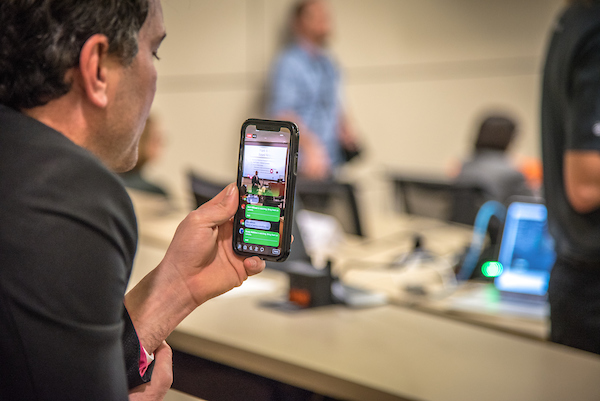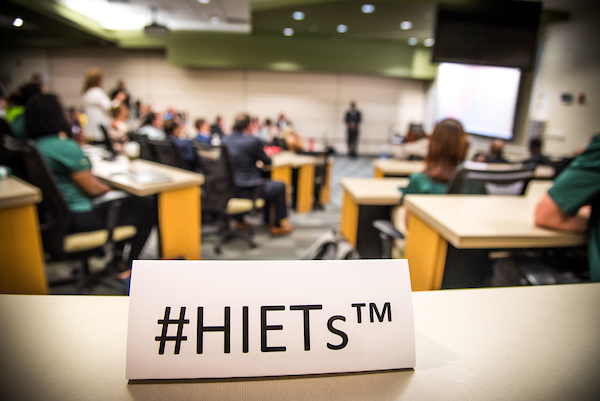The Healthcare Imaginarium for Exponential Technologies, or HIETs™ is the brainchild of visionary College of Pharmacy Dean Kevin Sneed
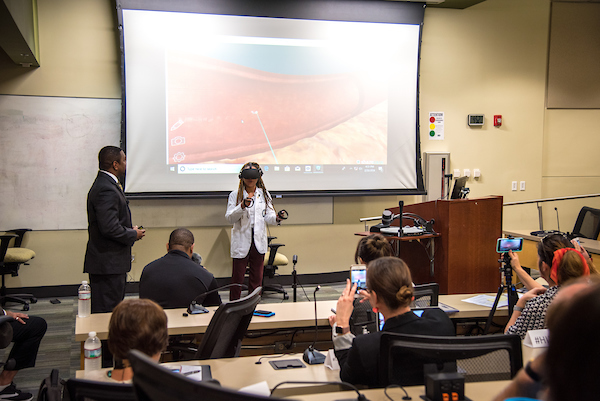
Kevin Sneed, PharmD, (standing right) dean of the USF College of Pharmacy, spoke about how exciting new technologies would be integrated into the college’s currriculum starting this fall.
TAMPA, Fla. (Feb. 22, 2018) — USF Health’s Pharmacy Dean Kevin Sneed, PharmD, announced this week several key initiatives intended to integrate advanced technologies into the student curriculum and to keep the college at the cutting-edge of innovation in education, research and patient care. He spoke Feb. 20 to a gathering of business and community leaders, as well as students, faculty and staff.
“We want our USF College of Pharmacy to remain relevant not only today, but for the next 25 years,” Dr. Sneed said. “Right from the beginning, our mission has been to revolutionize health through innovation and empowerment… Now is the time to reimagine what education will be moving into the future.”
The initiatives are part of a newly created Healthcare Imaginarium for Exponential Technologies™ or HIETs™. They include the introduction in fall 2018 of virtual reality content to supplement existing curriculum and help make the learning experiences of USF pharmacy students more immersive and life-like than textbooks, online content and traditional videos.
Students will put on special eyewear to view computer-generated images they could interact with. So for instance, they might experience in 360-degree, three-dimensional context the growth of plaques in coronary arteries and what happens when a stent is inserted to clear a clogged artery. In yet-to-be-developed ways, virtual reality technology may also seamlessly combine pharmacology with physiology to simulate the effects of treatment. For example, students could visualize in real-time the action on smooth muscle airways when a bronchodilator drug is inhaled by an asthma patient. Such advanced technology could also be harnessed by health professionals as a more engaging way to educate patients about their diagnoses and care, Dr. Sneed said.
The College of Pharmacy plans to work with MediaLab 3D Solutions, a Tampa-based digital content creator, and BioLucid, a digital health company recently acquired by Sharecare, to develop a combination of virtual, augmented and mixed reality content.
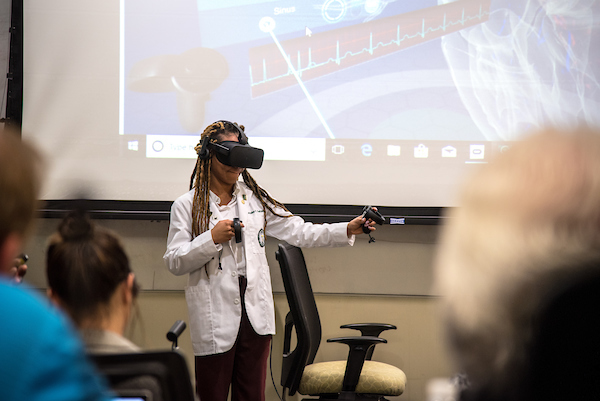
USF pharmacy student Natalie Dehaney demonstrates how virtual reality technology allows students to visualize what happens inside the body when a patient experiences atrial fibrillation. She can trigger and replay the simulation of electrical conduction in the heart.
MediaLab CEO Bruce VanWingerden said the project will be the first time the company, which works with major corporations, has ventured into academia. “This is an exciting opportunity to work with Dr. Sneed and his staff to really look at different ways to present in a new and exciting fashion information that can be difficult to convey,” VanWingerden said. “We want to take all the innovative technology and make it easy to use to further the educational process.”
Laysa Mena, a student delegate for the College of Pharmacy, describes herself as a “visual learner” who absorbs more by seeing than reading. “So I feel implementing virtual reality with our curriculum would be very beneficial and give us a better appreciation of how drugs work in the body,” she said.
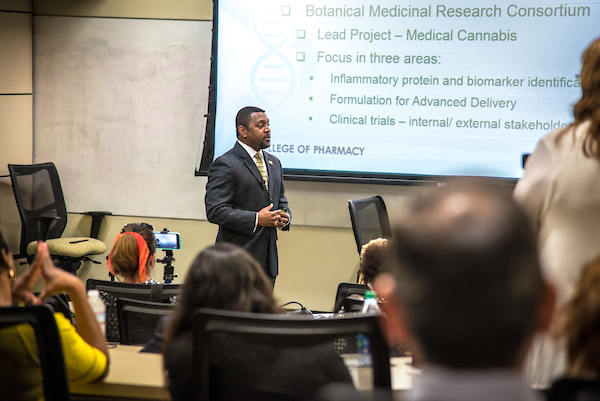
Dr. Sneed announced a key initiative known as the Botanical Medicinal Research Consortium, which will team USF researchers and clinicians with local companies to conduct evidence-based clinical research on whether non-euphoric forms of cannabis may benefit patients with certain diseases.
Another key initiative, known as the Botanical Medicinal Research Consortium, or BMRC, will bring together researchers and clinicians in USF’s colleges of pharmacy and medicine, the university’s Center for Drug Discovery & Innovation, and businesses in Tampa Bay and beyond to conduct rigorous studies on the safety and effectiveness of medical cannabis and other plant derivatives.
Many unanswered questions remain about the potential of cannabinoids, the active chemical found in the plant and elsewhere, to treat various diseases or conditions like chronic pain. The USF College of Pharmacy wants to take the lead in conducting top-quality research on medical cannabis and find the correct noneuphoric formulations that may benefit patients and their overall health, Dr. Sneed said.
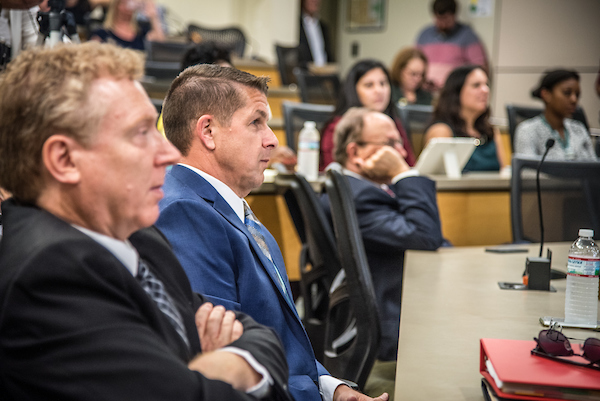
Mark Kindy, PhD (left), professor of pharmaceutical sciences, is the College of Pharmacy’s liaison for the Botanical Medicinal Research Consortium, and Kevin Olson, PharmD, MBA, assistant professor of biopharmaceutics and clinical research, is the liaison for the Entreprenerial Academy, a collaboration with the Muma College of Business.
“Plant-derived compounds are the future of medicine, and we’re looking forward to collaborating with the University of South Florida in this area,” said Garyn Angel, chief strategy officer for ANANDA Scientific, a company that produces nonpsychoactive and nonabusive oral cannabinoid health products. “Evidence-based clinical research is needed for cannabinoids to enter Western medicine.”
Dr. Sneed also announced that the BMRC would collaborate with the UCLA Cannabis Research Initiative at the UCLA Semel Institute for Neuroscience and Human Behavior, one of the first academic programs dedicated to investigating cannabis to lead public policy and public health decisions.
Other HIETs initiatives include:
- With the College of Engineering, USF Pharmacy will work to advance personalized medicine that tailors therapy based on an individual’s genetic makeup. As the technology of medicine and drug development continues to shrink down to the nanoscale, USF has also started a Pharmaceutical Nanotechnology master’s program to teach students how to deliver medications in new, more precise ways.
- The College of Pharmacy will join forces with the Muma College of Business to create an Entrepreneurial Academy that inspires innovation and start-up companies. The aim is to help pharmacists think like entrepreneurs so they can better enhance heath care outcomes and cost-effectiveness.
- Clinical trials: Through its WE-CARE program (Workgroup Enhancing Community Advocacy and Research Engagement), the College of Pharmacy partners with key stakeholders to increase participation of minority and medically underserved populations in clinical trials. The program seeks to ensure that all communities have access to genomic clinical research as technology advances.
-Photos by Torie Doll, USF Health Communications and Marketing
